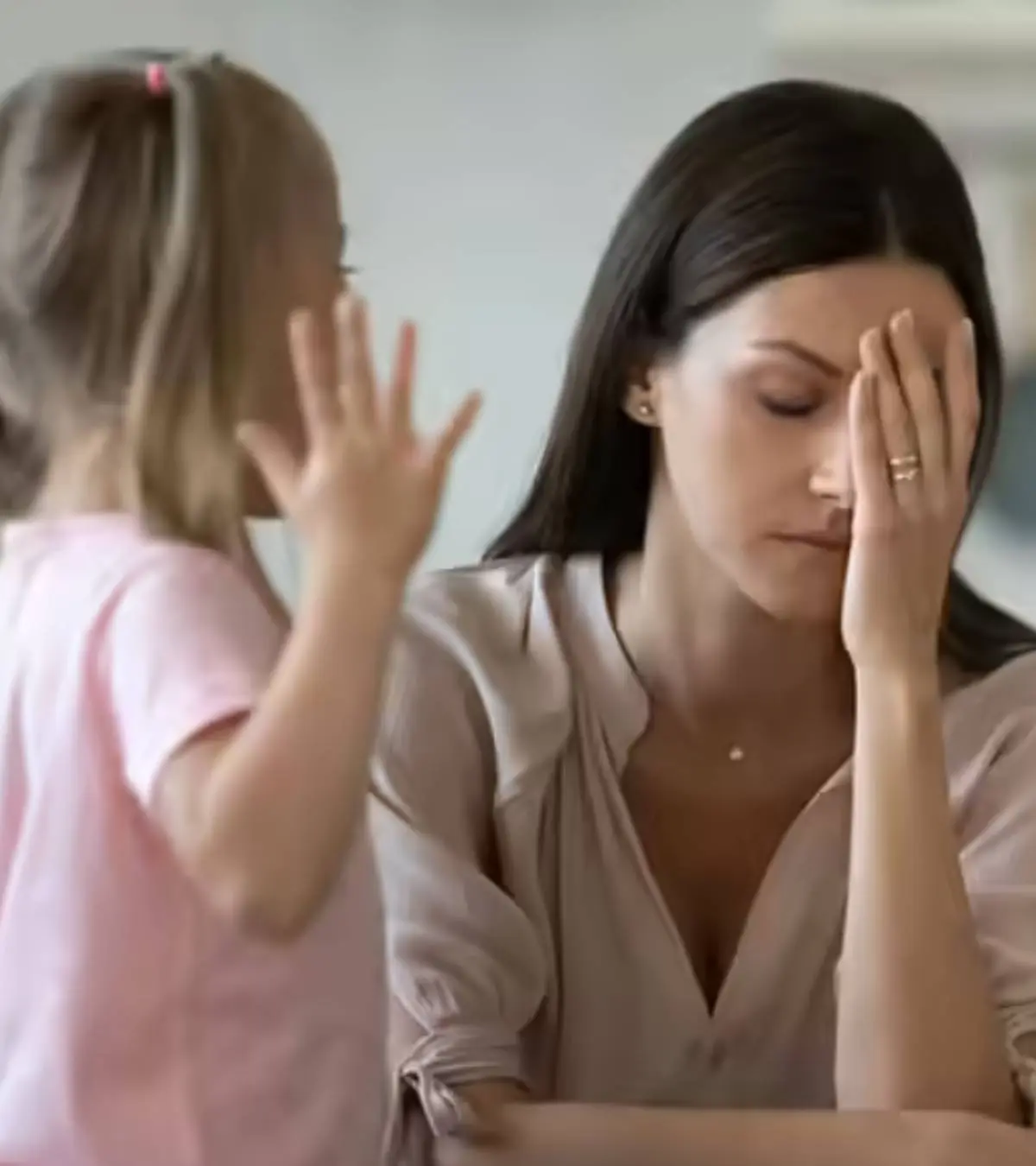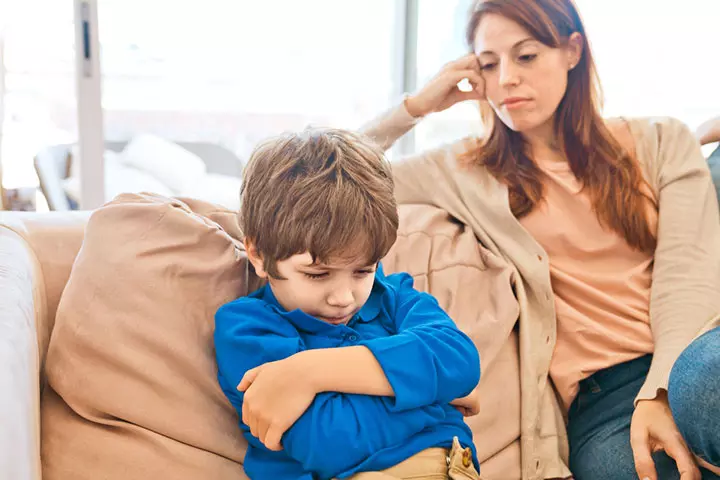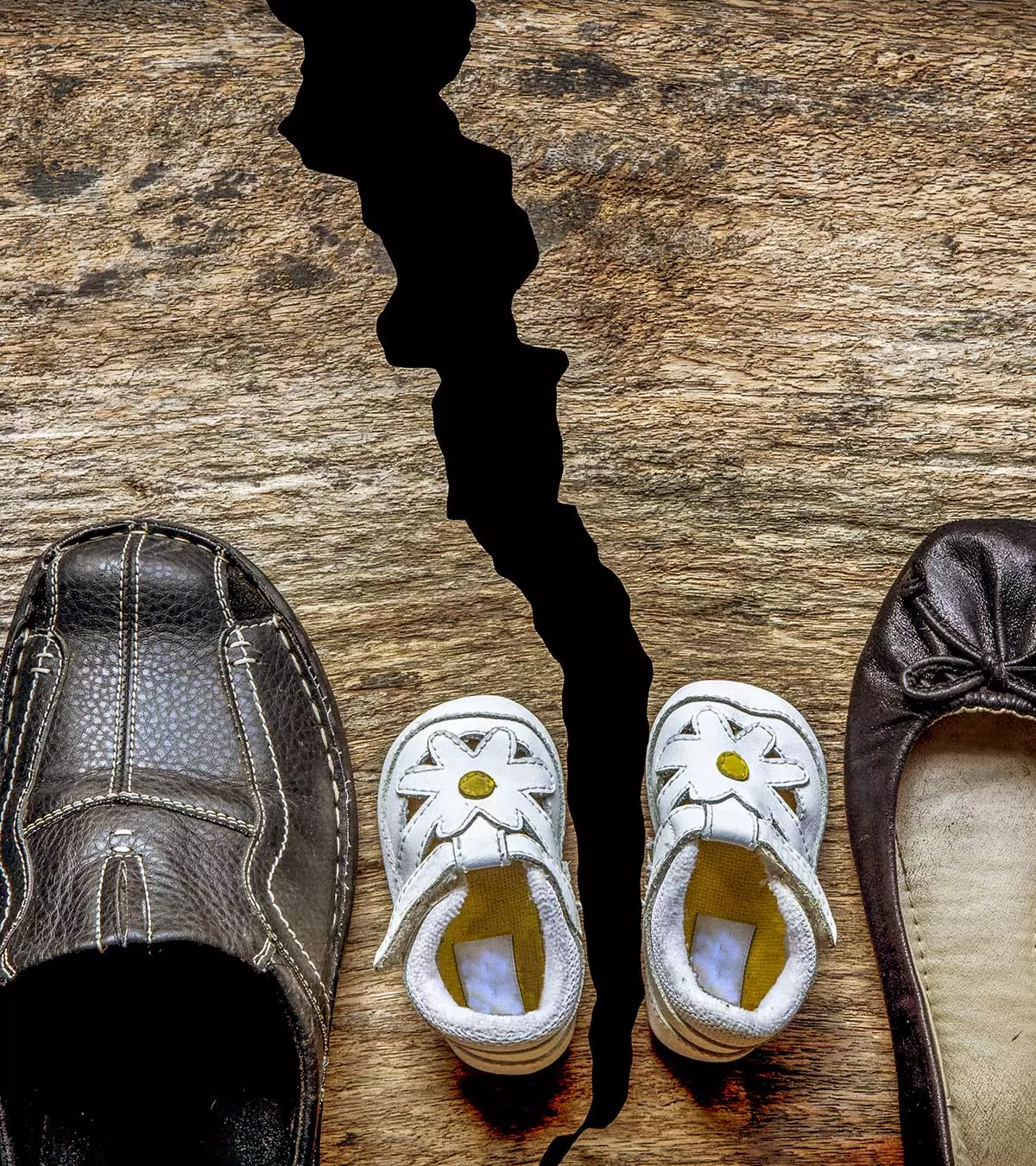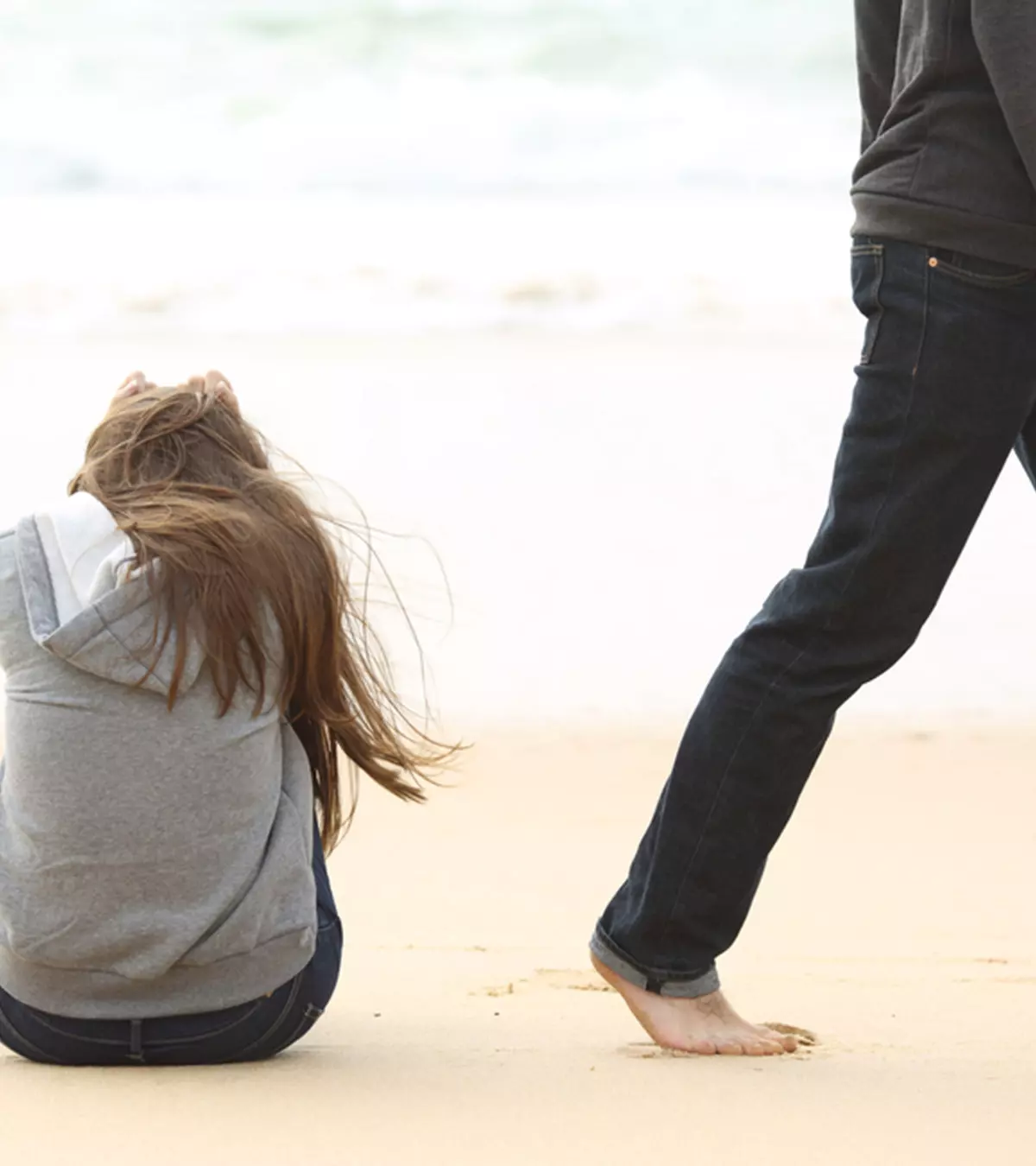
Image: iStock
Parenting isn’t always about hugs, kisses, and smiles. Parental feelings are multifaceted, influenced by stress, societal expectations, and individual mental health. At times, the pressure of raising children can be so overwhelming that you might find yourself questioning, ‘Why do I hate my child?’ Then, the next moment, you may be engulfed in feelings of guilt and resentment. Though parents are known for their unwavering devotion and self-sacrifice, things can get complicated when children start to grow up, develop their own beliefs and ideas, and exercise their will. Again, when your child disobeys you, you may have a fleeting thought of loathing. However, that never means you have given up your efforts for your child’s well-being or strayed from the commitment to protecting them. Hence, it does not make you a bad parent but proves that you are a human. In this post, we discuss why parents sometimes experience a feeling of dislike or hatred for their child and how to manage it.
Key Pointers
- Hatred for your child, at times, is normal and temporary.
- The feeling may arise due to their constant tantrums, lack of respect, marital issues, or health factors.
- Try to understand your child and spend some quality time together.
‘I Hate My Child’: How Normal Is This Feeling?

Parents think the feeling of dislike or hatred for their children is not normal. Some parents who were previously childfree now regret having children, sometimes to the extent of admitting to not loving their children on anonymous online forums (1). Societal norms may not allow you to feel ‘I hate my child,’ and thus, they are not openly acknowledged. Your friends might frown upon you, and your family might judge you. Rest assured that such feelings are normal at times. You can detest your child sometimes.
When your child is mischievous and doesn’t listen, you may show patience and perseverance. You may even try to change them with your love. However, when their behavior gets out of hand and causes trouble to everyone, it could get on your nerves, and you might dislike them for a brief moment. The feelings of dislike towards your child can stem from numerous other, more severe causes. Surveys have shown that parents who have had adverse childhood experiences or have poor psychological and somatic health are more prone to societal judgment, which makes them experience parental identity crisis and parental burnout. Regretting parenthood and disliking your children can also be related to your financial situation, marital status, and having children with special needs (2).
If you are battling with such feelings, do not worry. It is quite normal and may not stay for long.
So, why do some parents have such feelings? Read the next section to find out.
Reasons You Dislike Your Child

Going on a guilt trip for having negative feelings towards your child will steal your peace of mind and further deteriorate your relationship with your child.
Sharing a similar experience, an anonymous single mother of three from the UK says, “I’ve struggled this week being a parent. The kids argue. The kids won’t sleep. The kids won’t eat. It’s 3 a.m., and I’ve dealt with a screaming baby all night. I regret being a mother sometimes.
My children deserve better and a mother who is excited and interested in their projects and school life. But I’m tired. I’m tired of trying every day. Of work. Of house cleaning. Of pretending I know what I’m doing as I don’t (i).”
To resolve this, you need to know what triggers such unpleasant feelings towards your child. Here are some possible reasons.
- Your child is ungrateful and takes your love and care for granted.
- They use foul language and threaten to run away when you try to discipline them.
- Your child throws a tantrum if you disagree with them.
- They do not respect elders and make fun of them.
- They are irresponsible and do not care about your feelings.
- They demand expensive things and start making shrewd comments if you deny them.
Sometimes, the reasons could be associated with the parent (3).
- Depression in mothers is said to be associated with less positive parenting.
- Additional risk factors of depression such as poverty, exposure to violence, marital conflict, psychiatric disorders, and absence of the father can also cause negative feelings towards children.
- Sometimes, unresolved postpartum anger can manifest itself as hatred for the child. Women have reported feeling intense rage due to lack of support, pressures to be a “perfect” mother, and isolation. Traumatic childbirth experiences and lack of acknowledgment for their struggles also contributed to this anger (4).
Whatever the reason behind the negative feelings, you can address them and work on having a loving parent-child relationship. The next section talks about what you can do to reduce negative feelings towards your child.
What To Do When You Dislike Your Child
Feeling like you dislike your child and regret choosing to be a parent is a common feeling most parents are not keen on admitting due to the social stigma associated with it. But you must use certain tips and strategies to keep your feelings in check to do justice to your child and your role as a parent. Here are some things you can do when you feel ‘I hate my child.’
1. Acknowledge these feelings

The first step in banishing such feelings is acknowledging them and not feeling ashamed. This can help you stop thinking you are a bad parent and start working towards resolving these feelings. For instance, you can acknowledge that you feel frustrated when your child does not listen to you and then decide not to blame yourself and work on improving the situation. Change cannot happen until you are honest with yourself and accept that you or your child won’t always like each other.
2. Share your feelings with a trusted person
Sharing your feelings with a trusted friend or a family member can help you get a fresh perspective on the whole situation. You can confide in them and release all those negative feelings. This will give you peace of mind and the assurance that you are not alone in this. If you feel fear of judgment or if things are getting out of hand, you can also seek professional help. Counseling or therapy can provide tools and strategies to manage emotions and help create a healthier family dynamic.
3. Get to know your child

No child is bad by nature. The circumstances and situations make them naughty and stubborn. Once you know why your child acts in a certain way, you might not feel hatred towards them. Start observing your child more closely; whenever they act stubborn, try to find out the reason. Is it due to some stress they are going through? For instance, if your child refuses to do their homework, find out if they are feeling overwhelmed or have too much on their plate, and try to break the tasks into smaller chunks to see if they cooperate more. Try not to refute their explanations and excuses at once without knowing the background.
4. Keep your expectations in check
Sometimes, parental pressure can also cause children to misbehave. If you constantly nag your child to keep up with your expectations, they might flip out. Accept your child for who they are. Do not take their regular behavior as an affront to you.
If your child excels at painting and shows an averseness towards outdoor sports, pressuring them to enroll in the school football team may make them stubborn. Give them space to be themself, but keep a check on them to keep them away from bad habits and influences.
5. Identify and appreciate the good in them

Your child could be mischievous, but they will have some good qualities too. Identify such qualities and try to encourage them. For instance, your child may get in trouble often for talking too much at school, but they may have a talent for public speaking or storytelling. Point out their good nature and appreciate them. Resist the urge to deprecate them even if you are angry.
6. Do not punish or shout at them
Handling disrespectful children can be overwhelming, but do not lose your cool and shout or punish them, as this might make them even more rebellious. If you scorn them, they might turn hostile. Instead, talk to them in a soft yet firm tone. For example, if your child smashes a plate in anger, stay calm and tell them, “I understand you are upset, but let’s talk about why you feel this way instead of breaking plates.” This will reduce the chance of getting into an argument. Also, make sure that you never condemn their actions or vilify them in front of others.
 Quick tip
Quick tip7. Seek help
Raising a child can be a tiresome job. You need to attend to their needs and take care of their physical and emotional well-being. In other words, the responsibility of shaping your child’s personality is in your hands. This can put a lot of pressure on you and cause frustration.
If you find that you tend to degrade or disparage your child when you are low, get help. During such difficult times, do not hesitate to seek help from experienced family members or friends. If you feel things are getting out of hand, you can also seek professional help. For instance, you can enroll your child in a daycare program for a few hours each week to recharge and return to parenting with more patience.
 Quick tip
Quick tip8. Hate the sin, but not the sinner
Moody children may throw non-stop tantrums that can surely get on your nerves. However, remember that it is the child’s behavior that you loathe and not the child. Explain to them calmly why acting out in frustration and anger is wrong instead of berating them for having no control over their emotions. This will help you deal with your troubled child with love and compassion.
9. Do something together
Amidst all the chaos, there will be times when you can connect. Identify those times and try to do something you both enjoy. If both of you love watching football together, then catch up on a game together. Such activities together will go a long way in reducing the enmity between you and your child.
10. Stay positive
Though extremely difficult, dealing with such situations with a positive attitude may yield better results. Try using a soft tone and control your facial expressions when you are frustrated about your child being disrespectful or mischievous. Children pick up negative emotions faster and copy them in the same way. So, be a coach and a role model rather than a critic. You may try to encourage positive behavior in your child so that they know you love and care for them. Make your interactions less serious and more playful. Also, be more accepting and less worrying about your child’s present or future.
When And How To Seek Help
Disliking your children and wanting to scream, ‘I hate my child’ is a relatable experience for many parents. However, persistent negative emotions towards your child can harm you and them. Intervening early can help break cycles of guilt, resentment, and shame. Professional input can help you cope, heal, and build a healthier parent-child bond. Here is when and how you can ask for help.
When to seek help
- You are experiencing persistent negative emotions: When your feelings of resentment, hatred, or anger toward your child last for weeks or months, and these feelings interfere with your ability to care for your child.
- You notice signs of emotional distress in yourself: When you experience constant stress, sadness, or irritability and find it difficult to connect with or enjoy spending time with your child.
- You see signs that your dislike is impacting the child: When your child is showing signs of emotional neglect, fear, or low self-esteem, or if your feelings are heading towards verbal or physical abuse.
- You feel overwhelming guilt or shame: When you feel guilty about your emotions but you don’t know how to fix them and how to feel differently about your child.
How to seek help
- Therapy or counseling: A licensed counselor or therapist can help you explore the root of these feelings and repair your relationship with your child.
- Parenting support groups: Local or online parenting support groups can provide you with perspective and understanding from others with similar struggles.
- Talking to a trusted professional: Besides therapists, your child’s pediatrician, a social worker, or even a clergy member can guide you to appropriate resources.
- Self-help strategies: Reflect and work on your mental health and practice mindfulness, self-care, and journaling. You can also educate yourself about parenting challenges and child development.
- Hotlines and crisis services: If you fear that you may harm yourself or your child in a moment of crisis, call a hotline or emergency services immediately. In the US, you may call or text 988 for mental health support.
Frequently Asked Questions
1. What is it called when a parent doesn’t like their child?
When a person hates children or has a fear of children, it is called pedophobia (5). They may show an unnatural animosity towards children. However, no fixed term describes a parent who doesn’t like their child.
2. How do I stop being mean to my child?
Control your anger before you talk to your child. If you revile them while being angry, it might hurt them deeply. While talking to them, be calm and composed. Choose the right words to convey any issue and avoid using words or phrases that can hurt, insult, or intimidate the child. Above all, refrain from physical force or punishments.
3. How to control my anger with my child?
When you get angry, take deep breaths and time out to focus on controlling your emotions. If you feel you may hit your child, go to another room and try to reason your urge to yell, scream, hit, or threaten a child. Find out why you are angry and speak to your partner, family member, or confidant to vent your emotions. If nothing seems to help, seek professional help to control your anger from spoiling your relationship with your child.
‘I hate my child’ is a strong statement and may stir up quite a discussion. However, feelings of mild loathing or resentment towards your child are normal. It does not imply that you despise them. You may just not want to be around them at that moment. It may drain you when your child is disrespectful, swears, or throws tantrums. However, do not show your contempt and abhorrence openly. Instead, try to remain calm, understand that they are children, and reason out their behavior while finding a solution. After all, they are your children. Spend more time with them, approach them with love, and create an environment where they feel comfortable to share their feelings. With time, you may start to see a positive change.
Infographic: Reasons You Dislike Your Child And What To Do About It
“Am I a terrible parent?” This may be the question niggling at your mind when you feel resentment toward your child. But before beating yourself up about it and succumbing to unnecessary self-loathing, understand the rationale behind your feelings. Moreover, this infographic can help you effectively deal with your dislike of your child. Illustration: Momjunction Design Team
Illustration: I Hate My Child: Is The Feeling Normal And What To Do About It?

Image: Dall·E/MomJunction Design Team
Feeling overwhelmed and frustrated with your kids? Learn what it means when you hate your kids and how to cope.
Personal Experience: Source
MomJunction articles include first-hand experiences to provide you with better insights through real-life narratives. Here are the sources of personal accounts referenced in this article.
i. I hate being a mumhttps://bryonyperfectlyimperfect.wordpress.com/2019/09/27/i-hate-being-a-mum/
References
- Elizabeth A. Hintz et al.; (2023); “I hate all the children especially mine”: Applying relational dialectics theory to examine the experiences of formerly childfree regretful parents.
https://www.researchgate.net/publication/372887053_I_hate_all_the_children_especially_mine_Applying_relational_dialectics_theory_to_examine_the_experiences_of_formerly_childfree_regretful_parents - Konrad Piotrowski; (2021); How many parents regret having children and how it is linked to their personality and health: Two studies with national samples in Poland.
https://pmc.ncbi.nlm.nih.gov/articles/PMC8294566/#abstract1 - Associations Between Depression in Parents and Parenting Child Health and Child Psychological Functioning.
https://www.ncbi.nlm.nih.gov/books/NBK215128/ - Christine H. K. Ou et al.; (2022); Seeing Red: A Grounded Theory Study of Women’s Anger after Childbirth.
https://journals.sagepub.com/doi/10.1177/10497323221120173 - Pedophobia (Fear of Children).
https://my.clevelandclinic.org/health/diseases/22538-pedophobia-fear-of-children
Community Experiences
Join the conversation and become a part of our nurturing community! Share your stories, experiences, and insights to connect with fellow parents.
Read full bio of Natalie Jay Campbell
Read full bio of sanjana lagudu
Read full bio of Akshay Nair
Read full bio of Apoorva K



















